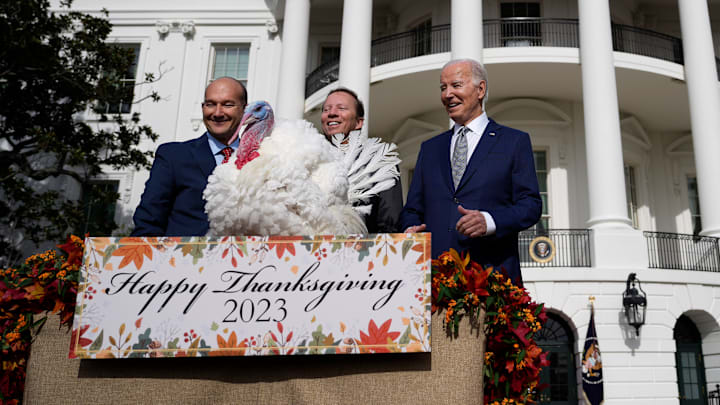Despite being the oft-forgotten middle child between Halloween and Christmas, American Thanksgiving is still an important time for families to come together and celebrate the good things in their lives. It may not be as flashy as the other fall and winter holidays, but it's still known for good food and gatherings of loved ones.
However, people often wonder how this holiday came to be and why we celebrate it the way we do. Generally, we think about turkeys, pilgrims, and the setting-aside of old grievences. But this idea actually ignores how often Thanksgiving has been political.
In 2023, Thanksgiving is set to take place on November 23. This, of course, prompts the question: why does Thanksgiving change dates? Every year, it's a different day, making it so many people don't know when it's going to be until they see it pop up on their calendar.
A brief history of Thanksgiving

Many Americans believe that Thanksgiving is the direct honoring of the pilgrims' feast in Plymouth, Massachusetts, but this was actually only one of many harvest festivals. These are common in nearly every agricultural civilization, as a celebration that the seeds planted in spring successfully produced new crops.
In fact, Halloween (Samhain in Celtic regions) was another prominent harvest celebration, explaining the many fruits and vegetables associated with it. Furthermore, there were many days of thanks throughout the colonial and early American periods, scattered throughout the year seemingly at random.
The actual origin of American Thanksgiving has far more to do with the United States government than it does any of the autumnal celebrations we often think of. In 1789, George Washington announced that November 26, 1789 would be a “Day of Publick Thanksgiving.”
As Washington explained, the day was to be spent thanking God for the survival of the first European settlers and the revolutionaries who were responsible for the new country. In particular, that year held the first Thanksgiving in order to celebrate the US Constitution, which came into effect in March 1789.
With this in mind, Thanksgiving might just as easily be considered Constitution Day. However, many of George Washington's successors found the holiday to be too grounded in religion. Thus, it had no official status for nearly a hundred years.

In 1863, Abraham Lincoln declared the first federally recognized Thanksgiving Day. In an attempt to bring the divided nation back together, he once again instructed the nation to thank God on November 26.
From there, it swiftly became part of American Law. Thanksgiving was recognized as one of four annual holidays by the "Holiday Act" in 1870. However, the wording of that was that Thanksgiving could take place on "any day appointed or recommended by the President of the United States."
However, many thought of the last Thursday of November as sacred to the American way, rejecting Franklin Roosevelt's attempt to reschedule it in 1939. From there, it was only a matter of time until it was set in stone.
Why does it change dates every year?

After Lincoln declared an annual day of Thanksgiving in 1863, subsequent presidents renewed the holiday for the last Thursday of each November. But why did they choose to follow the day of the week, rather than the date set by both George Washington and Abraham Lincoln?
Perhaps, it's simply a matter of wording. After all, Lincoln referred to the date as "the last Thursday of November," rather than referencing its number. There's certainly something to be said for precident. But his phrasing actually has its own source, separate from the US government.
Sarah Josepha Hale, the editor of the American Ladies' Magazine, spent years petitioning politicians for the last Thursday in November to be set aside for an official day of gratitude. Because of this contribution, she is sometimes known as the Godmother of Thanksgiving.
However, that's not the end of the story. As mentioned in the previous section, FDR tried to change the schedule. Thanks to requests from retailers, he pushed the holiday to the third Thursday of the year in the hopes that people would do more holiday shopping.
When 16 states refused to acknowledge the change, they knew some kind of intervention was necessary. Congress officially designated Thanksgiving as the fourth Thursday of the month in 1941, a schedule we have followed ever since.
In the end, the origins and scheduling of Thanksgiving are a combination of national pride, dedicated petitioning, and tradition.
Keep an eye on Ask Everest for answers to all the Internet's questions.
